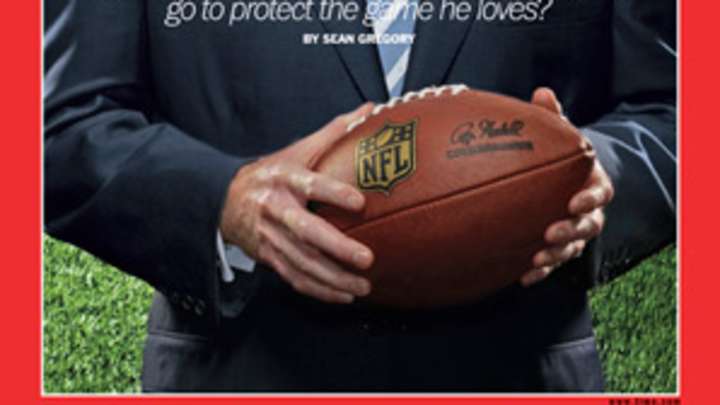Roger Goodell opens up on letting the Chiefs play, possible rule changes

(Courtesy of TIME)

Love or hate Roger Goodell, there is no getting around the fact that he is carving out a lasting and impactful legacy as NFL commissioner. No issue has been more front and center during the Goodell era than that of player safety.
Specifically, Goodell, the subject of the cover story in this week's TIME magazine, has focused much of his attention on reducing the number of head injuries suffered during NFL games.
That aim has driven a bevy of rule changes over the past few season. The most obvious include putting officials in charge of sending players out of the game if it's suspected they have suffered concussions and cracking down on high, dangerous hits.
But is there more on the way?
One of the more prevalent talking points lately has centered on the dangers of kickoffs. Prior to the 2011 season, kickoffs were moved up to the 35-yard-line, drastically decreasing the number of returns attempted. If at least one NFL coach has his way, the league won't stop there.
According to TIME, Goodell recently discussed with Rick McKay, Falcons president and head of the NFL's competition committee, a radical rule change proposed by Tampa Bay coach Greg Schiano. Instead of a kickoff, the team that scored would then take the ball on its own 30-yard line in, essentially, a 4th-and-15 situation. In other words, they could attempt to keep their offense on the field and try to pick up 15 yards, at the risk of turning the ball over on downs; or they could punt.
"I don’t do things for public relations," Goodell said. "I do things because they’re the right thing to do, because I love the game."
Limiting kickoff returns is one thing (even that drew groans from fans), but eliminating them completely in favor of an off-the-wall replacement rule? That might change the game dramatically, and not necessarily for the better.
As Goodell pointed out to TIME, kickoffs arguably are the most dangerous plays in football because of the high-speed collisions that occur there. Tweaking the framework to add player safety, then, is smart ... but Schiano's brainchild is an off-the-wall idea that may force the NFL to find a happy medium between that plan and the current system.
Already in place for next season is a rule that will force all players to wear both thigh and knee pads. Many players have expressed frustration with that proposed thigh/knee pad mandate, arguing that the extra equipment would slow them down and, in turn, lead to a worse product on the field.
Goodell is walking a very fine line between the noble cause of making football safer for the players and bastardizing the very game itself. Seemingly with each passing day, though, we learn more about how damaging the brutal NFL can be, both for players currently playing and those who have retired.
The issue dove into the spotlight again last weekend, under the most tragic of circumstances. Saturday, Chiefs player Jovan Belcher shot and killed his girlfriend, Kasandra Perkins, before turning a gun on himself in front of Kansas City's coach and general manager.
Belcher had no prior history of concussions, but his tragic incident was another piece of evidence for those who would argue that the NFL does not do enough to protect its players -- physically, mentally or emotionally.
Heavy criticism was cast, too, toward the decision for the Chiefs to take the field for a game against Carolina, slightly more than 24 hours after Belcher's murder-suicide.
Goodell discussed with TIME his reasoning:
"It was ultimately my decision," said Goodell, who, according to TIME's report, also arranged for grief counselors in Kansas City. "But it was important to get the views of the players and try to honor their wishes. Clark [Hunt, Chiefs chairman] got back to me and said Romeo [Crennel] and the captains felt that playing the game -- being together as a team and a community -- was important. So that’s exactly what we did."
The Chiefs won, 27-21.
